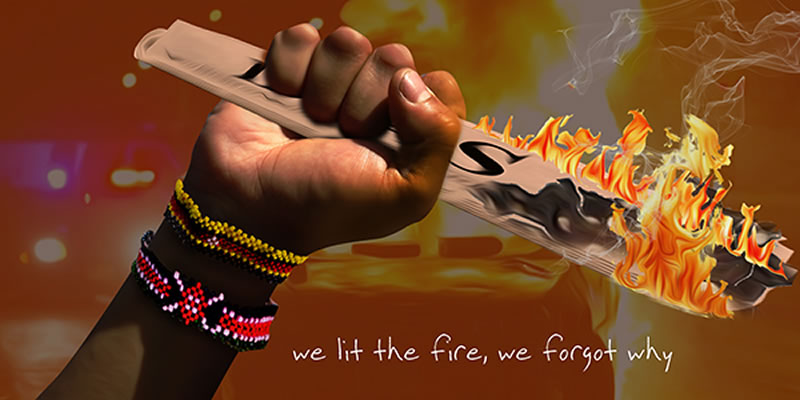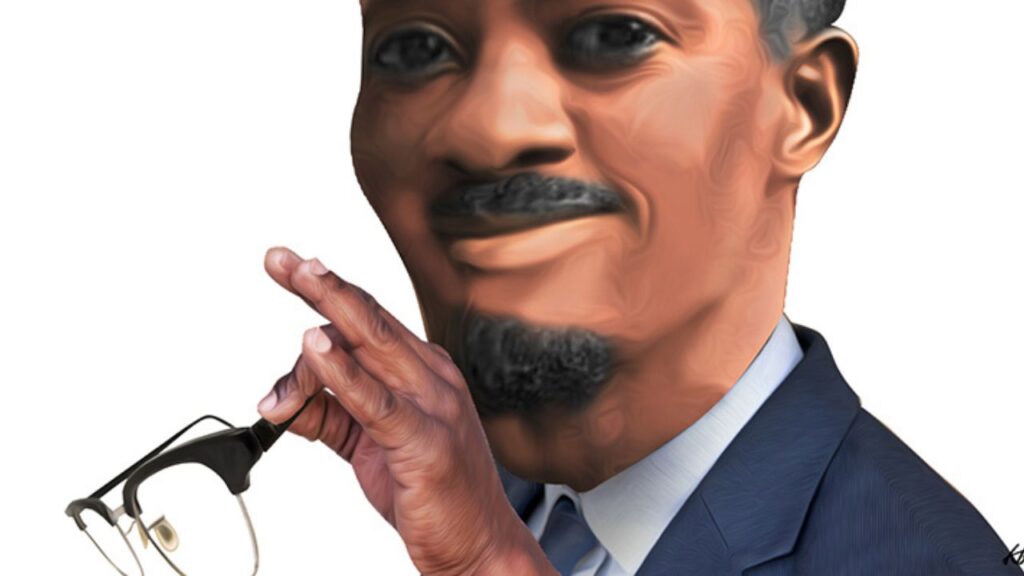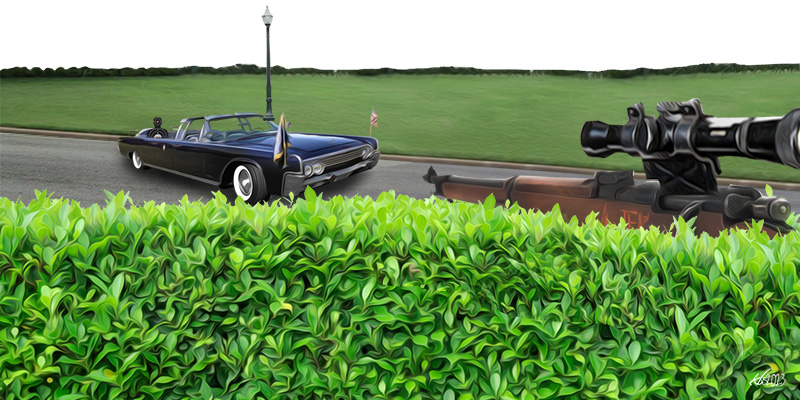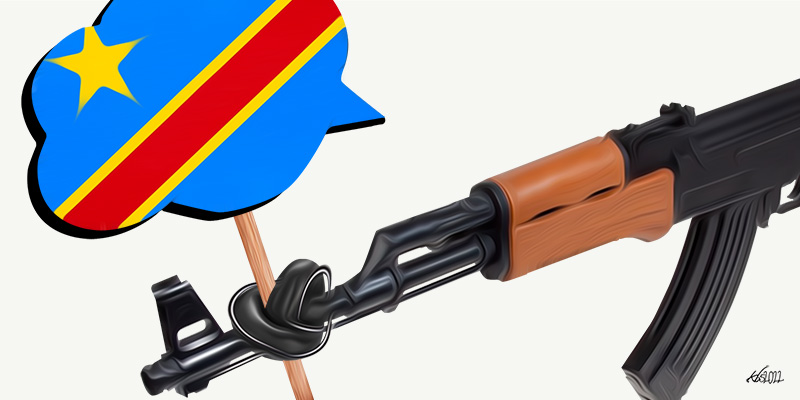In her subtly seminal work of fiction Dust, the novelist Yvonne Adhiambo Owour names “silence” as Kenya’s third official language, after English and Kiswahili.
Kenya today is a challenging place to live in, especially if you are young, very old, female, and not rich, which is just about everybody.
The country is currently in the grip on an election cycle. This suggests that change is on the way. Or is it?
This article should be about who is saying what to the electorate, and what their chances are.
But, given the grim economic realities for those called “the poor” in Kenya, it would seem that Kenyan elections since the return of multipartyism have been about not who is in the running, but who is not present. More about what is not being said, than who said what. Somebody seems absent from the party.
What happened to the Kenyan revolution?
In just one succinct paragraph written in Kwani 02, Andia Kisia, eschewing the de-personal that data-reciting brings to the matter of “development, tells us the meaning of poverty in Kenya, and the need for change:
“What does it really mean to say that a people are not yet ready for a revolution? A revolution implies change to the status quo and the status quo in Kenya, as in any so-called developing country, is a sorry one indeed: it is poverty of the most life- destroying kind, a situation maintained and defended by a small wealthy and avaricious class. Open any development economics text, and Kenya always merits a mention as one of the countries with the largest disparities between rich and poor. The poor know this not as an interesting fact in a textbook, but as their daily reality: as the ignorance of daily meals, as the death of children from the most innocuous ailments, from medieval life expectancy rates. It seems unforgivably arrogant to say that these people do not want to see the substance of their lives change for the better, that they are not ready for that change. So what does it mean to say that Africans in general, or Kenyans in particular, are not ready for revolution? (p. 311)
Into the breach has sauntered a whole cast of hugely colourful characters, whose activities generate plenty of sound. Given how increasingly lethal electoral politics have become here, perhaps it is better not to name names or point to examples. But we can all think of at least two.
The antic-laden political drama rolling out this election season seems to see nothing of the concerns Andia Kisia describes, and takes place against the meta-narrative of the Odinga/Kenyatta sometimes friendly, sometimes acrimonious almost Lebanese-style feud in which the son of a former Vice President is going to run against the son – now President – of the President to that Vice President.
All our yesterdays
To hear, or rather, to have heard Kenya’s literary giant Ngugi wa Thiong’o tell it, Kenya once was on the brink of a socialist upheaval that was to sweep away the entire basis of post-colonial Kenyan society, and even excavate its settler colonial roots.
This perspective took root among more than a few intellectuals, and many youth, particularly students. It gave rise to heated discourse in the media and led to public demonstrations. The authorities reacted. Riots and other disturbances were dealt with physically. Interestingly, however, there was also an engagement at the level of ideas, in however circumspect a style executed. Ngugi, in particular, acquired a couple of nemeses in the media and academia that seemed to devote much of their energy to tracking and deconstructing his various arguments.
At a more exalted, shall we say, level, even the Kenyan presidency was moved to weigh in. This basically became an extension of the Cold War debates about the best or better ways to organise society. As such, the philosophical dimension of the matter was often brought in.
People were individuals, not “cogs in a machine”, one would hear the president assert at some national function.
That was back in the very late 1970s.
Today is a different picture, to say the least. We certainly don’t hear many –if any – national figures tussling with tenets of Enlightenment thinking.
How did mainstream Kenyan politics move from talk for and against revolution to what we see now? Or more accurately, why is there such a persistent silence around this question, to the point that it never even seems to get asked?
There is a memory hole. One can trace the evolution of radical thinkers such as Ngugi from the days of the December 12 Movement, right up to a certain point, then everything seems to go dark. Why?
A promising beginning
One key factor in Ngugi’s global appeal was the way in which he wove the Kenyan story into the fabric of wider and older struggles for social justice, if not outright revolution.
To South American intellectuals, his analyses of the meaning and impact of settler colonist culture resonated strongly with their own centuries of Portuguese and Spanish settler presences.
He must easily be the first, and possibly only, English language-rooted African writer I have come across who could reference and cite a whole host of Spanish and Portuguese-speaking South American writers and thinkers at will, and even draw parallels with them.
To African diaspora thinkers in the Caribbean, the United States and Europe, especially England, his specific focus on the linguistic and ethnic workings of anti-African racism struck a similar chord.
This did present problems. To match his narrative with theirs, he had to present Kenya as one country.
The 500-year Iberian dominance of South America had produced a political culture that expressed itself in Iberian languages, and framed its vision from within what was considered the most advanced stages of all the European thinking birthed by the Enlightenment: Marxism. A certain homogeneity of direction emerged there. Even Catholic priests in the region espoused a “liberation theology” rooted in Marxist ideology.
Other strands existed. The one of particular significance would be the voices of the indigenous people still present in the South American continent. Sometimes small, often marginalized, these varied communities somehow managed to get through a nearly complete genocide, with memories and critically, language, somewhat intact.
It was Ngugi’s on-the-ground activism that cemented this global reputation. His writing, fiction first, then a series of accompanying essays bedded in some form of critical theory, had given life to his ideas. The fiction often located itself in the politico-cultural experience Ngugi’s own Kikuyu people underwent during the late colonial period in Kenya, and just after, particularly, the impact the eight-year war waged against freedom fighters had on him as a young man from a family caught up in the conflict.
He began by applying his thinking to his place of work, the University of Nairobi. What he did can now be seen as a template for even the “decolonize education” movement in South Africa today. Three things happened: the Department of English Literature became the Department of Literature; the course content began to reach systematically far beyond the original staple of European/English classics; and Ngugi became a marked man.
His next major initiative was the Community Theatre initiative, through a couple of productions featuring peasant folk (a process that began to cement in his mind the question of language: In what language had struggle been taking place? What was to be the language of the new revolution?)
In insisting on the development of a literature in (in his case) Gikuyu, he spoke the language of indigenousness while advancing the politics of the progressive imagining of the European-planted states. With the historical ignoring of the surviving Native Americans in South America, all revolutions could comfortably converse in Spanish or Portuguese. In Africa, the natives, and their languages, sit in the mainstream. So, while the aforementioned homogeneity of language and, therefore possibly also, thought, could comfortably emerge among South American revolutionaries, Africa was to be a different matter. This was a contradiction waiting for explanation, and one that Ngugi’s intellectual critics (state-sponsored or not) seized upon: was he proposing a revolutionary Tower of Babel, or would certain languages acquire a preeminence in the lexicon of revolution?
Nevertheless, such was the giant who landed among the Black and African diaspora of London in the early 1980s. A writer, a teacher, an activist, former political prisoner, and exile.
Modesty on the part of many Kenyan activists in London at the time often leads them to downplay the significance of their presence – with Ngugi at its centre – among the people they went on to work with. Modesty, maybe, or perhaps as a way of drawing a veil on the journey of Kenyan politics from that point, to this, where citizens killed one another, and where poverty and destitution remain national characteristics.
The template for the exile part of their movement seems to have been the long- established anti-apartheid movement, kicking off with the formation of the Committee for the Release of Political Prisoners in Kenya.
This I suppose, was a good start. And it seems a decision was made that what the movement did not otherwise have in order to build support in Europe, it was going to have to create. The mining of the anti-colonial, anti-settler narrative was a logical place to start. South Africa had settlers, so had Kenya.
Don’t get me wrong; it must have taken a special kind of courage to decide to take on any Kenyan regime during the Cold War. Many an otherwise safe middle class career was being sacrificed by becoming associated with rebellion; they were taking on one of the (then) better organised police states on the continent, with an unbroken praxis in the matter of breaking rebels, reaching back into the 1950s; they were also standing up to a regime that in the dynamic of the global US vs. USSR confrontation, was seen by Western interests as a critical bulwark.
This was not small thing to be doing.
Exile dementia
I was in a position to observe how Ngugi, and the cluster of well-entrenched black activist networks that received him, went on to unfurl the public face of Kenyan resistance to the Daniel arap Moi regime and to imperialism among the diaspora.
It was also an exercise in comparisons. As a diaspora activist on Uganda issues, I was keen to see where our concerns may intersect, and what each learned from similar experiences.
Three things emerged quite distinctly.
First, an antipathy towards engaged debate. This was evidenced in an inability to address the question mentioned already, which was legitimate in itself, but also became a reliable propaganda tool for the Moi regime due to the revolutionaries’ unwillingness to address it.
Specifically: what was the 1951-1958 conflict in Kenya? Was it a war for Kenyan independence? Was it a civil war among the Kikuyu nation between those “in”, and those “out” of colonial favour? Was it a Kikuyu cultural uprising for the reclamation of their land? Would parsing such distinctions matter anyway?
This came out strongly in the way the Kenya Liberation story was presented. As an early activity, a broad group of pan-Africanist youth, from places as far flung as the Caribbean, Ghana, Senegal and, of course Kenya, staged Ngugi and Micere Mugo’s play The Trial of Dedan Kimathi.
Something remained with me from that time.
One particular passage in the staging (and I cannot recall whether it was part of the original text or not) had the actor explain how “the white man came to Kenya and promoted divisions among the people by teaching them that ‘You are Girama, and you Samburu, and you Kamba…’, or words close to that. The point being made was that Kenyans were one people, and that if they stood together as one nation, victory was assured.
But this, and other lines like it, would then be followed by enthusiastic bursts of singing of songs someone had clearly researched well from the era of the Mau Mau uprising, just about all of which were in Gikuyu, not surprisingly.
So (the ahistoricity aside) another question came to mind: was the struggle about liberating a pre-existing nation called Kenya, or about creating one through such a struggle?
But where there was such an aversion to debate, no answers seemed available.
Second, there was a fascination with things military, and particularly the associated secretiveness. Statements like “armed struggle is the highest expression of a peoples’ culture” were often made, but not quite explained. This also expressed itself in an unwillingness to clinically describe and analyse the Mau Mau war with anything like the vigour it would be presented in drama. Outstanding questions like:
How did the war end? Did the insurgents win? If so, why is there still a need for “liberation”? If not, why did the fighting stop?
Third, a woeful naivety about how people managed to remain in State Houses in our region. I recall expressions of genuine surprise among some of these comrades, as well as among the “vague leftists” of the Abdul Rahman Babu variety, about the way the then government of Julius Nyerere had returned to the Moi government the Kenya Air Force officers who had fled to Tanzania after their abortive 1981 coup attempt.
After his efficient inveigling, then swallowing up, of the Zanzibar revolution at the Americans’ behest in the early 1960s, any attentive observer of our region should have known where President Nyerere stood on Empire questions once the chips were really down. And if you get into the business of organising rebellion against a Western-backed regime, you would be well-advised to become a very attentive observer.
For revolutions, failures of theory lead to failures of practice. And bouts of brisk physical activity can often be used to cover up those gaps, or deflect scrutiny from them.
This was the opportunity and circumstance created by the roughly one-year period (1985-1986) during which the National Resistance Army morphed from a rebel organisation into the internationally recognised government of Uganda.
During the greatly under-reported proceedings of the Kenya Truth, Justice and Reconciliation Commission, a number of interesting puzzle-pieces came to light that certainly help explain a few things about the sudden disappearance of a whole revolutionary movement.
There had emerged a certain mesmerisation, to put it very mildly, at least among the Mwakenya activists I knew, with the NRA, and its ascension to power.
No less than three Kenyan resistance groups received material support in military training and information from the early NRA regime. To ask what happened next, is to stand at the mouth of the memory hole.
Contradictions and their silences
Nowhere does this seem to come through in the politics of the NRA assuming power in Uganda. And nobody seemed less willing to see the NRA for what is was than many among the movers and shakers of the Kenyan resistance.
This led to complications for us in the exile discourse spaces that exile politics caused us to share, as well as raised serious questions about the Kenyan resistance’s actual commitment to human rights, democracy and, in a few cases, simple logic.
Of course, nothing was usually said explicitly in public spaces – that would only encourage a debate – but it was clear that the crop of Kenyan resisters we knew were in awe of the NRM, and clearly lacked an intellectual or political interest in any analysis before that.
The starkest, and in a way worrying, example I saw of this was the sight of one prominent exile activist literally dancing with joy at a remark made by the then very new President Yoweri Museveni who had come to make his first address to the large UK Ugandan community at the Commonwealth Institute headquarters in 1987. This person is now a prominent political personality in Kenya.
The remark itself had been a hackneyed rehash of Kwame Nkrumah’s “we are pro-Africa” declaration of non-alignment. On being asked by a member of the largely star-struck gathering if NRA was “pro-East, or pro-West”, the president had responded, “We are pro-Uganda”. The audience applauded, and the Kenyan danced.
There was more to come.
How come they were happy to defend the then NRA practice of open-air queue voting while condemning the Moi regime when it sought to implement the exact same practice during Kenya elections?
Why did they condemn the Moi-KANU regime as a one-party state, while ignoring the NRA’s 1986 Legal Notice No. 1 that banned all other political party activity?
Why was the near-permanent presence of British soldiers in Kenya a thing to be condemned, while nothing was to be said of the accreditation of the British military attaché to the UK Nairobi embassy, as “advisor” to the NRA delegation at the 1985 Nairobi Peace Talks?
If the NRA was indeed an anti-imperialist organisation, then how should we explain the generous praise heaped upon it by the UK media? Or were they accepting the idea that the UK media were not tied to the task of promoting British interests? If so, what had happened to all the critical theory about race, and representation, and about the media space as a battleground over hidden and open narratives? When the African mind was being “colonised”, did the Western media play no role in this? Is it, in other words, to now be taken as “neutral”?
There were never answers given to these questions, only silence and dismissals. This thinking seemed to stem from an earlier failure to address intellectual contradictions.
The practical effect for anyone else fishing in the same waters was to find oneself permanently doubted by the leaders of black diaspora organisations, and a few white socialist ones as well. “If you are interested in the Ugandan revolution”, they would ask, “why don’t you simply go and join hands with the revolutionaries that have just taken power, instead of trying to fight them?”
Why should they believe your words against a whole, ANC-type organisation peopled by the cream of the Kenyan Left intellectuals?
It became important, therefore, to settle the question of black diaspora views of the emerging and triumphant NRA. And the first step to this would have been to settle the matter with the go-to voice on matters East African in the UK: the Kenyan anti-Moi resistance.
This was not possible, as they showed no inclination towards a principled political stand. I vividly recall one experience where one of their senior cadres, who also worked in a senior post at the good old Africa Centre, simply blocked the proposal that activist groups from the Uganda exile community also participate in the holding of the upcoming Africa Day celebrations, which were to focus on Uganda that year. Instead, an agenda of the festivities to be led by the (now (NRA/NRM-run) Ugandan embassy in the UK was very rudely imposed on the organising committee.
Get it clearly: a political refugee was defending the right of a sitting government to lock other political refugees out of a discourse regarding their own country.
But here’s the thing. The tragedy was not so much that the Kenyan revolution sold the myth of an NRA “liberation” to the Afro-Caribbean diaspora; it was that they also sold the same myth to themselves. My submission is that the subsequent strategic decisions made on the basis of that miscalculation led eventually to the absence of a viable “Left” voice, or even a simple legacy, in Kenyan politics today. Hence the endless Bonfire of the Vanities, aka, election time.
Footnotes to a lingering silence
However, a few years prior to that, I had had my own experience, while I was still active in London. I chance encountered the same prominent member of the anti-Moi resistance, right on the steps of the Africa Centre.
His tune, to which he was not dancing, had changed significantly. Having just come back from a trip to Uganda, he gave me a wholly unexpected response to my polite query as to how his trip had gone.
He had not one kind word to say about the entire NRA project or its leaders. His rant was long and excoriating, as well as very accurate.
This, coming from the same person I had witnessed pirouette with joy at a Ugandan presidential witticism, stunned me into silence. What could possibly have happened?
This is where the silence begins.
I will not speculate. I know of only two things. One, I read in a newspaper, of the Ugandan government’s decision to remove a certain key figure of the Kenyan armed resistance from Ugandan soil to Sweden. This was in the early 1990s.
I read also of a development years later when a small article and photograph showed members of what was being called the February Eighth Revolutionary Army (FERA) being repatriated back to Kenya after standing down, having been isolated in training camps in Uganda for nearly a decade.
It is back to the Kenya War of Independence riddle: How did Uganda’s relationship with the Kenyan revolution end, and for what reasons?
I asked a Kenyan writer, who had been tweeting a running commentary on new Moi-era Nyayo House revelations by former Mwakenya activists who had survived the torture chambers, if any information was coming out from them about how and why their relationship with the Uganda “revolutionaries” ended up? After promising to check and get back to me, I have not heard from her since on the matter. Has she too lapsed into the Kenyan language of silence?
I have lived with this issue for over thirty years, it turns out. I had to become knowledgeable about it because of the extent to which it was damaging our own political work. Now, I want to stop.
Reflecting on it a few years ago for an essay, I had emailed a response to someone I had known to be in the anti-Moi resistance regarding mail he had sent to me about some recent outrageous behaviour by his former friends now running Uganda. Basically, I asked if he was willing to accept his share of the blame in selling this outfit to the global Left, and what the hell had happened to him anyway, to disappear just like that?
“Many factors, global, local and internal to our movements ensured that we failed,” he wrote back. “Lack of discipline, knowledge, greed, dictatorship, sexual violence, lack of proper organisational accountability and so much else. Many young Kenyans perished because of what I think we can call ‘left bourgeois apathy’ and a lack of real political commitment. (Bourgeois envy of the rich was the driver of the ‘revolution’ and once achieved then the revolution for them had arrived). Thereafter, people must continue to justify their existence so they must continue shouting to at least assuage their ‘left consciousness’.”
There can be no doubt that conventional Kenyan politics, like the structure of the Kenya economy itself, cannot provide solutions to the deep-seated structural problems that Ngugi wa Thiong’o so ably began to describe and analyse over 40 years ago.
It is as if time has opted to stand still where the critical issues, like land reclamation, war reparations and workers’ rights, are concerned.
And there can be no doubt that if nothing useful is done, things will only get worse.
If there ever was a need for clarity of discourse, perhaps it is now, and if there was ever a place in need of it, perhaps it is Kenya. Instead, the country remains swamped in the politics of personality and inconsequence, and the very name “MwaKenya”, ends up reduced to a schoolyard slang for exam cheat-notes. An apt tribute, perhaps, to an organisation with too many leaders with a penchant for subterfuge and cutting intellectual corners.
Meanwhile, the last time I checked, a progressive diaspora space known as the Third World Book Press remains listed as the Uganda Chicago Consulate’s contact point for the Ugandan Diplomatic Mission to the United States.
Thanks, comrades.








